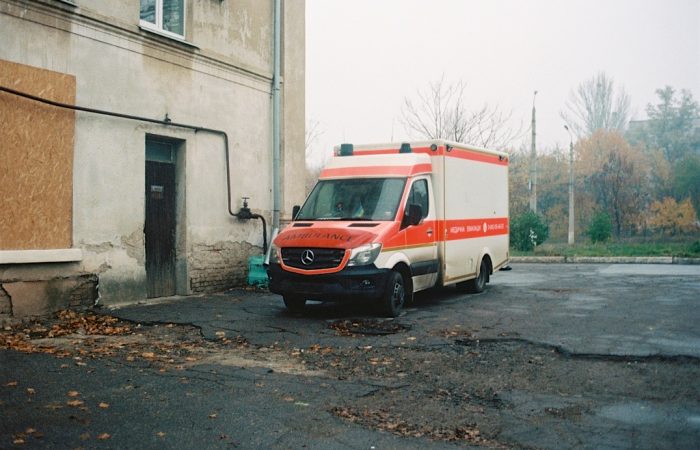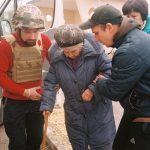Context
Access to mobile healthcare services for women
As of 4 April 2024, the WHO had documented 1,682 attacks on Ukrainian healthcare facilities. Even when facilities are not damaged, civilians have difficulty accessing medical treatment due to a severe shortage of staff and resources, road damage and limited means of transport in rural areas. Although telemedicine-equipped mobile clinics have been set up to provide primary care services, more significant health problems requiring advanced diagnosis and immediate referral are not treated, and serious illnesses and situations arise for which preventive medicine could have been used earlier.
Women are particularly affected by this situation. For instance, 70% of calls to the mobile clinic services are made by women. Cervical cancer (CC), the second most prevalent cancer amongst women aged 15-44 in Ukraine, comes with a mortality rate four times that of parts of the European Union. Regular screening and HPV vaccination can contribute to significantly reduced rates of CC. However, even prior to the full-scale invasion, less than two-thirds of eligible women had received a screening within the previous five years and HPV vaccination is not included in Ukraine’s national immunisation schedule. Similarly, Ukraine has focused on a program of early diagnosis, rather than nationwide mammogram screening, to prevent cancer. However, this has been similarly disrupted by the invasion, as well as limited access to resources including trained staff and mammograms.
Access to Prosthetics & Orthotics (P&O) care for people with disabilities
Since 2014 and particularly the full-scale invasion, there has been a rapid expansion in the number of people with disabilities. WHO estimates suggest anything between 0.5-1% of any population require Prosthetics & Orthotics (P&O) or rehabilitation services, suggesting a user base exceeding 400,000 in Ukraine who will require ongoing, lifelong care even after the war is over.
P&O workers include clinical professionals and associates, as well as non-clinical technical staff like technicians. Of the approximately 400 P&O personnel in Ukraine, just 21 are clinicians trained to international Professional or Associate standard. As a result, many Ukrainians injured in the war have been forced to go overseas to be fitted with suitable prosthetics – but a child with limb loss may require 70 or more years of refitting’s and follow-up care.
Goals
- Providing mobile primary healthcare and diagnostics services to women affected by the war in Ukraine, mainly in – but not limited to – the east of Ukraine in the de-occupied areas of Kherson and Kharkiv Oblasts.
- Increasing access to P&O care delivered by trained professionals in Ukraine.
Activities
- Providing new vehicles for women health, manned by a trained gynaecology nurse/technician and equipped with Starlink, a portable ultrasound device, a colposcope and diagnostic equipment ;
- Offering training in a range of rehabilitative & P&O professions (clinical professionals, associates, experts, counsels, among others) to people with disabilities in conflict and post-conflict settings.
MYRIAD CANADA is working with the Legacy of War Foundation on this project, a charitable incorporated organisation whose mission is to alleviate the financial needs and suffering among victims of war and armed conflict throughout the world, and to advance the education of the public and of persons in authority concerning the prevention and reduction of armed conflict. The organization operates in Ukraine, Rwanda, Lebanon and Europe and has raised over £600,000 since 2017 to support communities impacted by conflict.
Giles Duley, the Founder and CEO of Legacy of War Foundation, is a photographer, writer and campaigner. He is a UN Global Advocate for those living with disability caused by conflict. In 2011, whilst working in Afghanistan, Duley was severely injured by an IED. As a result of his injuries he is a triple-amputee. In 2012, he returned to Afghanistan to continue his work as a photographer. In 2017, the Sunday Times included him in their Alternative Rich List, for those who are ‘rich in experience, rich is spirit, rich in life….’ In this list, Natasha Kaplinsky said of Duley “Even catastrophic injury has not stopped him doing what he feels he should be doing with his life.”
Myriad Canada’s role is to carry out charitable projects across the globe in accordance with its charitable purposes. We control and monitor the use of funds and the progress of charitable activities to ensure that donations made to Myriad Canada have the greatest impact in accordance with donors’ expressed wishes. As a member of the Myriad Alliance with offices in Canada, the US, Europe, Asia and Australia, Myriad Canada has a vast international network and extensive practical expertise.
How to support this project?
By credit card: At the top right of this page, indicate the amount you wish to donate, and make the donation online by credit card. You will receive a receipt for tax purposes by e-mail just a few minutes after making the donation. It is simple and fast!
By cheque:
- Make your cheque out to Myriad Canada.
- IMPORTANT NOTE: We receive a lot of cheques! You must please indicate “Project D206 – Healthcare for Women and Poeple with Disabilities Ukraine” in the memo line of your cheque to ensure that it is allocated correctly.
- Mail your cheque to: Myriad Canada, 1 Place Ville Marie, Suite 1670, Montreal, QC, H3B 2B6, Canada.
By Direct Deposit:
- For transfer instructions, please email or call Caroline Chaulet: caroline@myriadcanada.org or +1 438 300 8122.
For Donation of Securities:
- Please email or call Caroline Chaulet: caroline@myriadcanada.org or +1 438 300 8122.
For Monthly Donations:
- We use CanadaHelps. Please find the link here.
If you need any assistance, please do not hesitate to contact us.
All donations are eligible for a tax receipt in Canada.
The projects are managed with the greatest care and professionalism.




